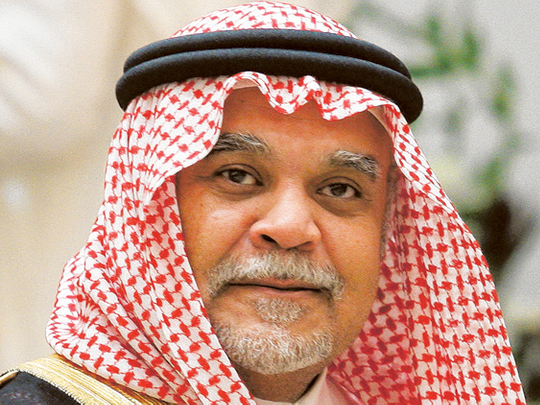
Dubai: The removal of Prince Bandar Bin Sultan from his post as chief of Saudi Arabia’s intelligence has raised many questions and speculation over the career of a man once considered one of the most powerful of the kingdom’s princes.
While the government attributed the dismissal to Bandar’s bad health, there is speculation that it may be connected to his performance on the Syria dossier that he was handed when he was made intelligence chief in July, 2012.
“It is a personal resignation,” said Khalid Al Maeena, a prominent Saudi analyst and editor-at-large of Saudi Gazette English-language newspaper.
“He has been in the public business for a long time,” he added, suggesting that he may be retiring. “He wants to spend more time with his family and write his memoirs”.
The 65-year-old prince was replaced by his deputy, Yousuf Al Idriss.
According to Saudi media reports, Prince Bandar was removed from his post “at his own request”. However, the royal decree quoted by the Saudi Press Agency on Monday did not say if the prince would continue in his other position as head of the National Security Council (NSC), a body that was founded in 2005 with his leadership.
Gregory Gause, Gulf expert and author of Oil Monarchies, said the NCS was not a very prominent institution and was created as a personal platform for Bandar. “It has only had one publicised meeting since it began,” he said.
Military mentality
Saudi analyst and political science professor Waheed Hamza Hashem said the government may be trying to inject “new blood” into the intelligence leadership “to deal with developments and a different military mentality.”
“It is very difficult to speculate about Saudi internal or external politics,” Hashem added. “Nobody was expecting the appointment of Prince Bandar as intelligence chief [in 2012]. The appointment decision was surprising and the removal decision was equally surprising.”
“I believe all intelligence agencies in the region are involved in Syria, from Iran to Egypt including Saudi Arabia, Lebanon and Iraq. But whether the removal is related to our [involvement] in Syria, I have no idea,” said Hashem.
Some however said the removal may have to do with Bandar’s high profile regional positions. “It is clear that he represented hawkish positions on Iran and Syria that were proving costly for Saudi Arabia,” said Andrew Hammond, analyst at the European Council on Foreign Relations and author of The Islamic Utopia: The Illusion of Reform in Saudi Arabia.
“It’s mostly speculation for now,” said Gause, adding that the removal is most likely due to Bandar “not getting Syria done”. He said there was also likely to be concern in the Saudi leadership that Bandar’s alleged support for jihadist groups in Syria would lead to a “blowback” on Saudi Arabia, Under Bandar, he said, “Saudi Arabia concentrated on support for non-Al Qaida Salafist groups without abandoning the [largely secular] Free Syrian Army”.
Recalibration
While Saudi Arabia’s policy could change with Minister of Interior Mohammad Bin Nayef taking the Syrian dossier, said Gause. it is unlikely to be a “180 degree change”.
“The Saudis are committed to getting rid of Bashar Al Assad so they are not drawing back. There may be some recalibration of the Syria policy... [but] the Saudis are supreme realists and if Al Assad survives, they will see if they can do business with him”.
Hammond said the Saudis want to be seen as being on the same page as the United States on Syria “in terms of being very careful about what kinds of people they support and what weapons and money they give them... Bandar has essentially burned himself on those issues, having very publicly challenged the Americans. After all the bluster, I think [the Saudis] have realised they need the Americans as much as ever”.
Late last year, Bandar was quoted warning of a “major shift” from the US over its Middle East policy following the US’ reluctance to get militarily involved in the Syrian civil war.
Gause agreed that Saudi warnings about a “shift” from America had died down following US President Barack Obama’s visit to Riyadh earlier this month, but said the US was unlikely to have played a part in Bandar’s removal. Saudi analysts concurred.









